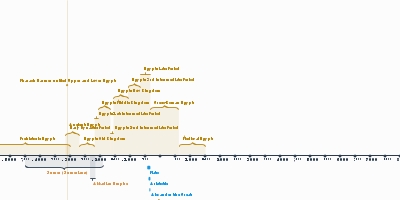Natufian culture (jan 1, 13000 BC – jan 1, 7550 BC)
Description:
The Natufian culture (/nəˈtuːfiən/[1]) is a Late Epipaleolithic archaeological culture that existed from around 12,000 to 9,500 BC[2][3] or 13,050 to 7,550 BC[4] in the Levant. The culture was unusual in that it supported a sedentary or semi-sedentary population even before the introduction of agriculture. The Natufian communities may be the ancestors of the builders of the first Neolithic settlements of the region, which may have been the earliest in the world. Natufians founded a settlement where Jericho is today, which may therefore be the longest continuously inhabited urban area on Earth. Some evidence suggests deliberate cultivation of cereals, specifically rye, by the Natufian culture, at Tell Abu Hureyra, the site of earliest evidence of agriculture in the world.[5] The world's oldest evidence of bread-making has been found at Shubayqa 1, a 14,500-year-old site in Jordan's northeastern desert.[6] In addition, the oldest known evidence of beer, dating to approximately 13,000 BP, was found at the Raqefet Cave in Mount Carmel near Haifa in Israel.[7][8]Added to timeline:
Date:
jan 1, 13000 BC
jan 1, 7550 BC
~ 5453 years
